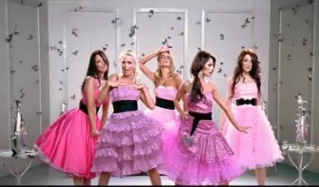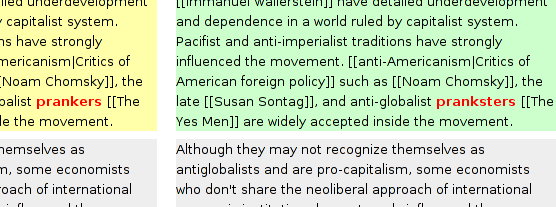The sex appeal of the inorganic
Like k-punk, I’d not been terribly impressed by the dubstep I’d heard up to know, until I heard the mix he points to by Autonomic. What I’d missed, and what this mix makes clear, is the relationship of dubstep to previous forms of dance music. My favorite track, at about 30 minutes in, weaves a muted classic hardcore melody into miscellaneous industrial sounds and an incredibly throbbing bassline. At first I found this beautiful but depressing, a kind of mourning for a dance music that’s now been lost. But it occours to me that it’s actually something much more interesting, because dubstep isn’t just related to an unreachable, lost, past, but to a much more immediate past, too. Dubstep effects a detournement of 2-step and, crucially, operates by taking what was most regressive in 2-step and the late UK Garage of the Dreem Team and others, and repurposing it.
“Soul” is the enemy of dance music, a return to ideologies of the organic, natural and “authentic” from which machines were supposed to have liberated us. Dubstep confronts the organicism which has captured much recent dance music, but not by a simple negation, an blunt excision of the human which would be ultimately sterile. Rather, dubstep’s reverberating alien bass, its disconnected fragments of treble, and its formless clatter of rhythms, combine to turn the organic inside out. Dubstep presents us with the perverse inorganic organicism of the machine.
This procedure should be an inspiration to revolutionaries. I’m reminded of Badiou’s remark that anti-capitalists are not simply opponents of capitalism, but more importantly rivals.
Leaving aside my continuing ideological objections
Not so long ago, I had curious desire to listen to some indie music; I’m not sure if it was reading Questionable Content or seeing Arab Strap (only at an instore thing, unfortunately, but they were still great, and their latest album is really excellent). Anyway, I don’t own that much indie, particularly not anything more recent than Britpop, so I turned to the internet, which supplied me with two radio streams, the distressingly cute Japanese nonstep and the stylish Italian Pig Radio. Here is some of what I listened to:
- The Gentle Waves - Falling From Grace
- The side project of Belle from Belle and Sebastian. This is really surprisingly good, especially as Belle and Sebastian are one of the worst bands in the world; winsome, “ironic,” proudly disfunctional. But this sounds not unlike an indie “No Regrets” by Girls Aloud, and the Gentle Waves have another track that sounds like Camera Obscura, so they’re doing pretty well.
- Sekiden - 1+1=Heartache
- A bit like Helen Love, if they were fans of 80s commercial rock instead of the Ramones.
- Sambassadeur - Between the Lines
- It turns out the Swedish do Scottish indie at least as well as the Scots. A little like the Cardigans were back when they were indie; only more indie.
- Souvenir - Amour et Degout
- A Spanish band singing songs in the style of French pop from the 60s. That’s really quite indie.
- Edith Frost - Easy to Love
- Country, or alt. country, perhaps, if that’s what it’s called. Anyway, I’d tentatively propose as a rule that country songs sung by women are all brilliant, and country songs sung by men are all terrible (with a possible exception clause for Boxcar Willie).
- Les Ondes Martenot - Colores
- Absolutely beautiful. The Chilean Delgados, more or less, and at least as good as that sounds.
Also on an indie tip, Laura recently(ish) posted some MP3s of her band, Operation Wolf, who are very good, very John Peel. I’m not sure what the prospects are like for “very John Peel” bands, these days, I fear it’s a harder niche to succeed in than it used to be, what with the absence of John Peel, and everything.
Indie bands: why not try recording a cover of SL2’s “On a Ragga Tip,” complete with “ironic” rapping? It would be dreadful, and possibly racist, but I bet it it would get you played on Zane Lowe.
The wisdom of crowds
Nice to see that Wikipedia remains committed to important questions of accuracy and quality.
Fears of headscarves, fears of politics
Incredibly annoying example of smug liberal racism in the Guardian last Tuesday. It was a letter, so I can’t find a link, but here’s the offending paragraph:
Our culture is tolerant of religious freedom and of the visible signs individuals choose to wear to demonstrate their faith. However, we are a secular society. Veiled and covered women are a sign of male dominance, not a sign of faith.
If nothing else, we can thank Helen Smith of Orpington, Kent, for a brilliant illustration of liberal respect for the Other as long as she is not actually Other (a point Žižek is fond of making). Troubled by the possibility of having to respect religious practices you object to? Simply redefine them so they’re no longer religious practices, and you don’t have to tolerate them.
The point being, if Helen Smith of Orpington, Kent, had stepped outside the acceptable liberal bounds of tolerance (that is to say, of disavowed intolerance), and had tried to make a genuinely universalist argument, the absurdity of her position would have become obvious. If “veiled and covered women” are a sign of male dominance, how about women in long skirts? In short skirts? In trousers? Wearing coats? Wearing nothing? In the anathematization of the veil, the gender dynamics instantiated by Western clothes are rendered invisible; Western clothes are both natural and universal, with Islamic forms of dress exceptional, singular, and oppressive. Of course, if Western liberals actually came out and said this they would be laughed at, and rightly so; but the old 19th Century Eurocentric logic remains, in a disavowed form, in liberalism’s spurious notion of tolerance.
The underlying similarity, I think, lies in liberalism’s inability to understand different sorts of differences. This can work out as imperialist universalism (all differences are to be condemned in the name of the universal), or a toothless multiculturalism (all differences are to be celebrated simply for being differences). Indeed, contemporary liberalism swings chaotically between the two. In neither case, crucially, does the liberal ever interpret a difference as an antagonism; if all differences are equally good or equally bad, one need never confront the possibility that there are some differences on which we may have to make a political choice, that is to say, to choose which side we’re on.
As Wendy Brown has pointed out, the supposed even-handedness of liberalism, the inability to choose a side, is a kind of moralism that is really a fear of politics, a desire for political questions to somehow be decided in advance, safe from the insecurity of political activity.
“The eternal is in any case more the ruffle on a dress than some idea”
 In the almost a month since I last posted anything here, I have mostly been either writing or grading papers. Interestingly, it turns out that if I’m too busy to write here, I end up sublimating ideas for posts into whatever I am writing. Hence, what was going to be a post on Benjamin and Girls Aloud worked its way into a paper on Marx [PDF]. I’m not sure I like the American academic schedule; maybe I’m just doing it wrong, but it seems like you’re expected to write a lot of papers all at once at the end of the semester, meaning you don’t really get to produce anything more than a first draft. Still, I hope this is a reasonable first draft of the theoretical basis of Marxism-Britneyism-Girls-Aloud-Thought.
In the almost a month since I last posted anything here, I have mostly been either writing or grading papers. Interestingly, it turns out that if I’m too busy to write here, I end up sublimating ideas for posts into whatever I am writing. Hence, what was going to be a post on Benjamin and Girls Aloud worked its way into a paper on Marx [PDF]. I’m not sure I like the American academic schedule; maybe I’m just doing it wrong, but it seems like you’re expected to write a lot of papers all at once at the end of the semester, meaning you don’t really get to produce anything more than a first draft. Still, I hope this is a reasonable first draft of the theoretical basis of Marxism-Britneyism-Girls-Aloud-Thought.

 In the almost a month since I last posted anything here, I have mostly been either writing or grading papers. Interestingly, it turns out that if I’m too busy to write here, I end up sublimating ideas for posts into whatever I
In the almost a month since I last posted anything here, I have mostly been either writing or grading papers. Interestingly, it turns out that if I’m too busy to write here, I end up sublimating ideas for posts into whatever I